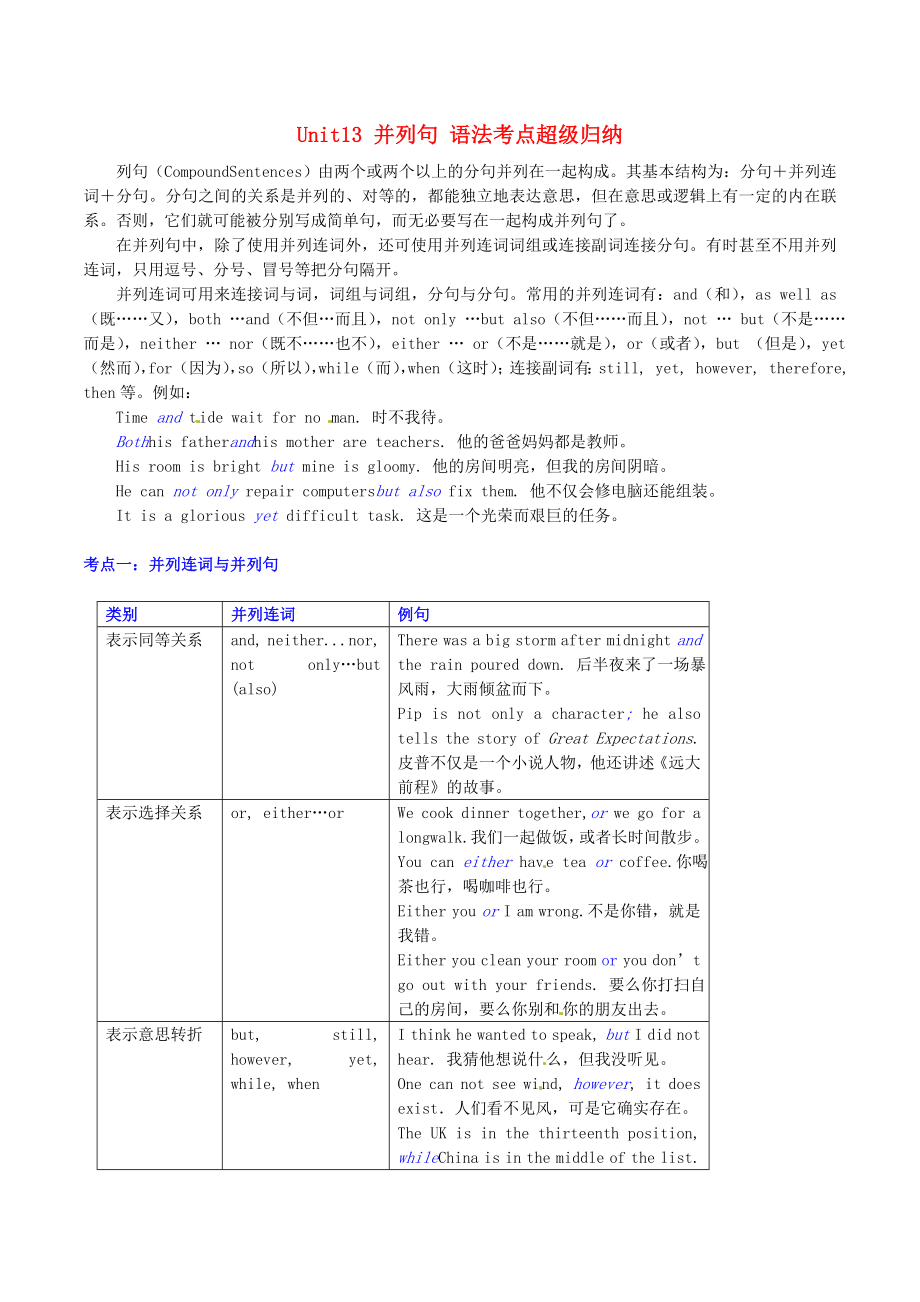《2015年高中英語 Unit13 并列句 語法考點(diǎn)超級(jí)歸納素材》由會(huì)員分享���,可在線閱讀���,更多相關(guān)《2015年高中英語 Unit13 并列句 語法考點(diǎn)超級(jí)歸納素材(4頁珍藏版)》請(qǐng)?jiān)谘b配圖網(wǎng)上搜索���。
1、Unit13 并列句 語法考點(diǎn)超級(jí)歸納
列句(Compound Sentences)由兩個(gè)或兩個(gè)以上的分句并列在一起構(gòu)成���。其基本結(jié)構(gòu)為:分句+并列連詞+分句���。分句之間的關(guān)系是并列的、對(duì)等的���,都能獨(dú)立地表達(dá)意思���,但在意思或邏輯上有一定的內(nèi)在聯(lián)系。否則���,它們就可能被分別寫成簡(jiǎn)單句���,而無必要寫在一起構(gòu)成并列句了。
在并列句中���,除了使用并列連詞外���,還可使用并列連詞詞組或連接副詞連接分句���。有時(shí)甚至不用并列連詞,只用逗號(hào)���、分號(hào)���、冒號(hào)等把分句隔開。
并列連詞可用來連接詞與詞���,詞組與詞組���,分句與分句。常用的并列連詞有:and(和)���,as well as(既……又),both …and(不但…而且)���,no
2���、t only …but also(不但……而且)���,not … but(不是……而是),neither … nor(既不……也不)���,either … or(不是……就是)���,or(或者),but (但是)���,yet(然而)���,for(因?yàn)椋瑂o(所以)���,while(而)���,when(這時(shí));連接副詞有:still, yet, however, therefore, then等���。例如:
Time and tide wait for no man. 時(shí)不我待���。
Bothhis fatherandhis mother are teachers. 他的爸爸媽媽都是教師���。
His room is brig
3、ht but mine is gloomy. 他的房間明亮���,但我的房間陰暗���。
He can not only repair computersbut also fix them. 他不僅會(huì)修電腦還能組裝。
It is a glorious yet difficult task. 這是一個(gè)光榮而艱巨的任務(wù)���。
考點(diǎn)一:并列連詞與并列句
類別
并列連詞
例句
表示同等關(guān)系
and, neither...nor, not only…but (also)
There was a big storm after midnight and the rain poured down.
4���、 后半夜來了一場(chǎng)暴風(fēng)雨,大雨傾盆而下���。
Pip is not only a character; he also tells the story of Great Expectations. 皮普不僅是一個(gè)小說人物���,他還講述《遠(yuǎn)大前程》的故事。
表示選擇關(guān)系
or, either…or
We cook dinner together,or we go for a long walk. 我們一起做飯���,或者長(zhǎng)時(shí)間散步。
You can either have tea or coffee.你喝茶也行,喝咖啡也行���。
Either you or I am wrong.不是你錯(cuò)���,就是我錯(cuò)。
5���、Either you clean your room or you don’t go out with your friends. 要么你打掃自己的房間���,要么你別和你的朋友出去。
表示意思轉(zhuǎn)折
but, still, however, yet, while, when
I think he wanted to speak, but I did not hear. 我猜他想說什么���,但我沒聽見���。
One can not see wind, however, it does exist.人們看不見風(fēng),可是它確實(shí)存在���。
The UK is in the thirteenth position
6���、, whileChina is in the middle of the list. 英國排在第十三位,而中國排在中間���。
I was about to go back to sleep when suddenly my bedroom became as bright as day. 我剛要睡���,突然我的臥室亮如白晝���。
表示因果關(guān)系
so, for, therefore
These are among the five richest countries in the world, so it is right that they should do so. 這些國家位于世界五大富國之列
7、���,所以他們這么做是對(duì)的���。
The day broke, for the birds were singing in the trees. 天已破曉,因?yàn)轼B兒在鳴叫���。
It was raining, therefore we had to stay at home. 天下雨���,因此我們只好待在家里。
表示條件或結(jié)果
and, or
Go straight on and you’ll see a bank. 一直往前走���,你就會(huì)看見一家銀行���。
Hurry up, or you’ll miss the plane. 快點(diǎn),要不然你就趕不上飛機(jī)了���。
Simply raise your han
8���、d, and a taxi appears in no time. 只要你招招手,出租車就會(huì)立刻過來���。
一句多譯:
1)這很奇怪���,然而卻是真的。
① It is strange, yet it is true.
② It is strange; yet it is true.
③ It is strange, and yet it is true.
④ It is strange. Yet it is true.
第一句中的yet為并列連詞���,其他三句中的yet為連接副詞���。
2)天氣晴朗,我們出去散了步���。
① The weather being fine, we wen
9���、t out for a walk.
② The weather was fine, and we went out for a walk.
3)他有兩個(gè)侄兒,都在美國���。
① He has two nephews, both of whom are in the United States.
② He has two nephews, and both of them are in the United States.
4)教室里有15人���,包括老師在內(nèi)���。
①There are fifteen people in the classroom, and the teacher was i
10、ncluded.
②There are fifteen people in the classroom, the teacher included.
③There are fifteen people in the classroom, including the teacher.
注意:
類別
例句
在主從復(fù)合句中���,不要在主句前誤加 and
要是下雨���,我們就不去釣魚。
正:If it rains, we won’t go fishing.
誤:If it rains, and we won’t go fishing.
and 連接的兩個(gè)詞已構(gòu)成習(xí)語���,與漢語順序相反���,
11、不可按漢語詞序表達(dá)
food and drink 飲食 ?? ?? food and clothing 衣食
rich and poor 貧富 ?? ?? ???land and water 水陸
right and left 左右 ?? ?? ?? north and south 南北
as well常用作狀語���,作“又���;也”解,相當(dāng)于too或also���,常位于句末���,無須用逗號(hào)與句子分開���;as well as常用來連接兩個(gè)并列的成分,作“也���,還”解。它強(qiáng)調(diào)的是前一項(xiàng)���,后一項(xiàng)只是順便提及���。因此連接并列主語時(shí),謂語動(dòng)詞形式要與前一項(xiàng)保持一致���;而用not only ...but also...
12���、連接時(shí),謂語動(dòng)詞形式與后一項(xiàng)保持一致���。
I am going to London and my sister is going as well (= too).我要到倫敦去���,我妹妹也要去���。
I am going to London as well as my sister.我要到倫敦去,我妹妹也要去���。
一句多譯:馬丁既能講漢語又能講法語���。
① Martin can speak Chinese and French.
② Martin can speak both Chinese and French.
③ Martin can speak not only Chinese but
13、also French.
④ Martin can speak Chinese as well as French.
考點(diǎn)二:并列句的句型
并列句句型
例句
祈使句���,and + 陳述句
Work harder, and you will make greater progress. 更加努力學(xué)習(xí)���,你就會(huì)取得更大的進(jìn)步。
名詞(詞組)���,and + 陳述句
One more effort, and you will succeed.在努力一把���,你就會(huì)成功。
祈使句���,or + 陳述句
Hurry up, or you won’t catch the train.趕緊���,不然你就趕不上火車了���。
一句多譯:
快點(diǎn),否則你就會(huì)遲到���。
① Hurry up, or you will be late.
② Hurry up, or else you will be late.
③ Hurry up, otherwise you will be late.
④ If you don’t hurry up, you will be late.
⑤ You will be late unless you hurry up.
 2015年高中英語 Unit13 并列句 語法考點(diǎn)超級(jí)歸納素材
2015年高中英語 Unit13 并列句 語法考點(diǎn)超級(jí)歸納素材

